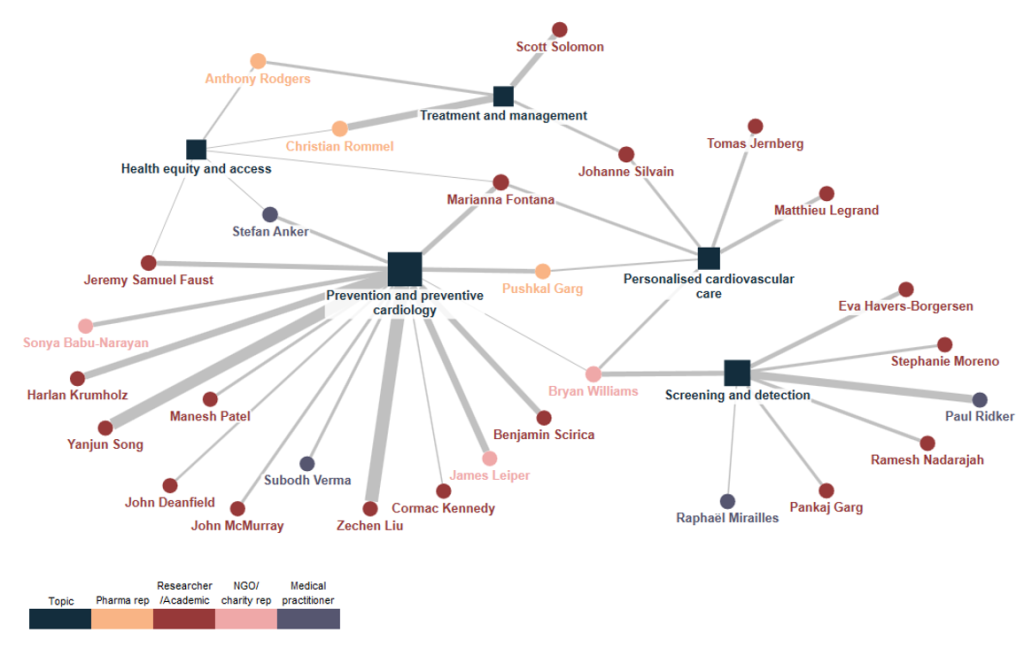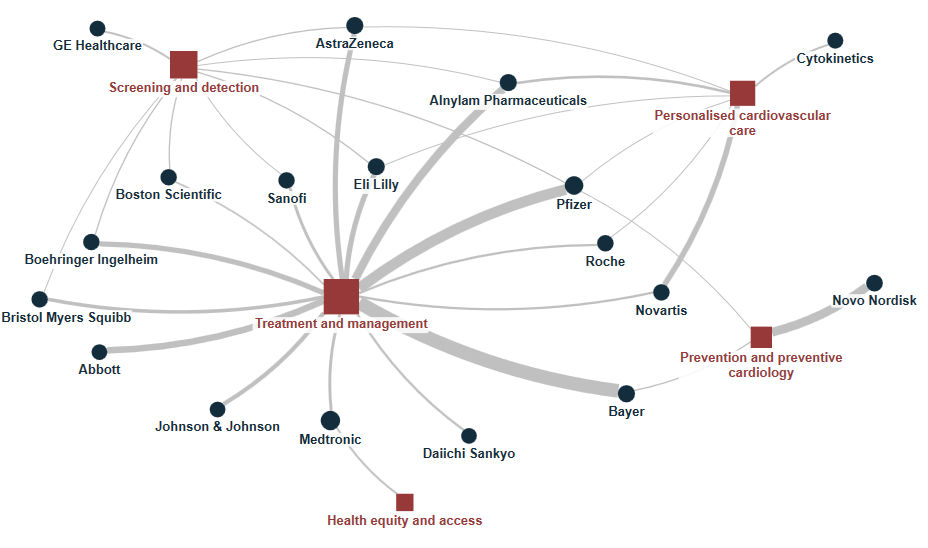This year’s European Society of Cardiology (ESC) Congress highlighted a narrative shift in cardiology, with prevention and detection gaining more prominence and overshadowing the traditional focus on treatment and management.
A change in perspective
Traditionally, cardiology discussions have focused on treatment strategies for managing established cardiovascular conditions.
But our analysis of circa 500 English-language articles published around ESC 2024 in the last month revealed an interesting narrative shift.
Prevention and preventive cardiology and Screening and detection emerged as the largest topics by share of voice, taking precedence over the traditional focus on treatment and management.
The Prevention and preventive cardiology topic was driven by researchers such as Yanjun Song and Zechen Liu from the Chinese National Centre for Cardiovascular Disease, who were the most widely cited spokespeople in the ESC 2024 media debate.
This is illustrated on the map below which shows the links between the topics (represented by squares) and the spokespeople (represented by circles):

Yanjun Song and Zechen Liu managed to dominate the discussion as their finding that compensating for sleep loss reduces the risk of heart disease gathered significant attention from both trade and mainstream media, as well as from promintnent cardiology thought leaders like Professor James Leiper, associate medical director at the British Heart Foundation, whose thoughts on the findings were cited in many articles.
Meanwhile, the Screening and detection topic was driven by one big trend: AI.
A study presented by Professor Bryan Williams, chief scientific and medical officer at the British Heart Foundation and Dr Ramesh Nadarajah, a health data research fellow at the University of Leeds, found that AI could help GPs identify patients most at risk of developing deadly heart conditions.
Obesity drugs took centre stage
Interestingly, the top-trending drugs in the world right now – Ozempic and Wegovy – emerged as the most prominent drugs in the discussion:
This was because new trial data presented at ESC showed that these obesity drugs significantly reduce the risk of heart failure.
The results were described as “revolutionising cardiovascular care” and further fuelled the Prevention and preventive cardiology topic.
Pharma still focuses on treatment
Against this backdrop, most pharma companies were mentioned in the context of Treatment and management, as illustrated on the map below:

This was because most pharma players focused their ESC communications on their latest clinical trials for drugs that treat cardiovascular conditions.
Bayer emerged as the most talked-about company here, as it shared positive results from a late-stage study of its Kerendia (finerenone) in heart failure patients with mildly reduced or preserved ejection fraction.
Other than that, very few companies engaged with prevention or detection.
Apart from Novo Nordisk, which funded the Ozempic and Wegovy study, notable exemptions were GE Healthcare, which unveiled AI-driven cardiac diagnostics solutions, and AstraZeneca, which participated in an evaluation of voice assistants in screening.
The bottom line
The overall sentiment of the ESC media debate was that there should be more efforts to detect and prevent cardiovascular conditions rather than to treat them when it’s too late and they’ve already developed.
This shift towards detection and prevention mirrors a similar trend we observed in oncology, as noted by our analysis of the ASCO 2024 debate, where there was an emphasis on how doing less treatments actually benefits patients.
So if there’s one key takeaway from ESC 2024, it’s that pharmaceutical companies have a significant opportunity to align their public relations and communication strategies with this narrative shift, emphasising their work on prevention and early detection.
This not only represents a good commercial opportunity alongside their traditional portfolio of treatment options but also aligns with the broader goal of improving long-term patient outcomes by addressing health issues before they become critical.
